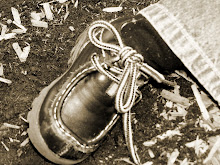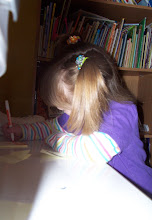Wednesday, September 17, 2008
Conflicted
This is my first year teaching in a program for students in grades Kindergarten through 2nd grade who have multiple and/or severe disabilities. While I could write a novel already on the rapid learning I have had to experience (because no one ever thinks to provide you with necessary information until after you manage to screw up - not with the kids, with curriculum guidelines, classroom organization, unwritten rules, etc.), I am currently very conflicted about one hot button issue. Inclusion is the hot topic in our district. You would think it was a new invention the way it is being talked about and handled instead of a practice that has been demonstrated beneficial and successful at all grade levels and at all ability levels (based upon what criteria you are assessing). We are not actually anywhere near full inclusion, and I don't think anyone mentions that, but we have inclusion committees at every school and we dance prettily around the issue to keep everyone happy (or at leas amused). My class is in a general education elementary school but my students are primarily self-contained, if not entirely self-contained (the most inclusion any student receives is up to 2 hours per day). I can argue both sides of this issue convincingly after hearing all of the debates since I was in high school and am not conflicted over that. What I am conflicted over is a long-standing "tradition" at my school. Apparently it is traditional to have each and every class at each and every grade level come into my classroom to "meet" my kids, to be "introduced" to them, and to "ask any questions they may have" - all in the name of promoting acceptance, tolerance, and inclusion. While I agree that information is power and I support a climate that welcomes diversity and is accepting and appreciative of all students I do not feel like this is right. Having four or five classes at 6 grade levels come into the classroom (over 600 students) to sit in rows and stare at my kids just feels wrong. My kids deserve the same dignity, respect, and integrity that is offered to all of the other students. They are not tools t be used in an object lesson. They are incredible individuals with unique thoughts, unique spirits, with unique desires, with unique likes and dislikes - but they do not have the ability to speak for themselves and say whether or not they want to be used in a lesson on disability, inclusion, tolerance, acceptance, and being different but still the same. So I feel that it is my job to speak for them, and my voice in my heart is screaming "NO!", it is screaming that this is degrading, that it is dehumanizing, that it is only further separating my children from everyone else in an "us and them" mentality, that instead of creating inclusion it will create a "school mascot" situation where they will be patted on the head and talked to as if they are cute little pets. Yet this has supposedly been done for years with tremendous success. Am I overreacting and reading too much into this? Or am I the first person in a while to consider that perhaps my children deserve a little more dignity and respect? Please share your opinion!!
Monday, September 1, 2008
The List

Every so often I open up the wooden box that holds my most precious little treasures and remove a single piece of paper from the plastic bag that protects it so that I can not just read the list of dates and times that cover both sides but touch them. I can feel the writing that records each time my infant self danced with death, and each time those who love me cut in and reclaimed me. Some of the dates are simply noted with a date and a time, some are noted with a date and time, others indicate that 911 was necessary, and then a few are circled to indicate that these were the episodes when I danced with death the longest. One in particular is circled in red, the episode that changed how my entire family views life. When I was 5 months old, my parent's were asked to meet with the group of doctor's that were providing my care at Children's Hospital in one of the conference rooms. I had been diagnosed with what was then labeled "near miss SIDS" a month or two prior when my mother discovered me without respiration or a clear pulse shortly after I had fallen asleep. No medical explanation for the severe apnea episodes was ever established, and so after running every test they could imagine the doctors had sent me home with an apnea monitor and the reassurance that I would outgrow the episodes by my first birthday. The issue was that in the early 1980s the apnea monitors were not very portable, and they did not function at all in automobiles. My parents had stayed out later than they planned, and on the drive home I accidentally fell asleep in the backseat. My mother was frequently checking my breathing, but in between those checks I slipped quietly into an apnea episode. When she discovered that I was not breathing the choices available to my parents were limited - the stimulation that usually roused me was ineffective, there were no cellular phones, and attempting CPR on the side of a rural Michigan road could be disastrous if I did not respond a there was no way to summon help. My father immediately began to drive to the nearest hospital while my mother attempted CPR (CPR in a Jeep at night is quite a challenge). When they arrived, my mother ran into the Emergency Room carrying me (at that point I was a limp infant lacking both respirations and a heartbeat and had progressed from the familiar blue tinge to a grayish color) in her arms and screaming. She noticed a doctor behind the counter and literally threw me to him screaming that he had to save her baby. Somehow he managed to convince my little body to restart itself, but he was so certain that I would crash again and not survive that he traveled with me in the ambulance for the transfer to the Children's Hospital well over an hour away. After stabilizing me and conducting further tests, my parents were asked to attend that meeting. It was at that meeting that the doctors, among the best pediatric physicians in the region, pronounced that I had been without oxygen for far too long and had suffered profound brain damage. My prognosis was officially changed to terminal with a life expectancy of less than 1 year of age, and my parent were told that even if a miracle occurred and I managed to survive longer my brain had been so badly damaged that I would never progress any further than the skills I possessed prior to that night in the Jeep. They strongly encouraged my parents to leave me at the hospital and allow the medical staff there to care for me until my imminent death. I do not know how my parents processed all of the information that was thrown at them, but I went home with them very soon after that meeting. I continued to have apnea episodes, some minor and some severe enough to require full CPR, up until just before my first birthday and then they abated just as originally predicted. As far as the doctor's predictions, my parent's fears dissipated slowly as I met each developmental milestone and then were dismissed when I began to read at the age of 2 1/2. The only remaining signs of any brain damage are gaps in my abilities to process visual-spatial information. There is no medical explanation for how or why I defied every single prediction of the doctors and the word miracle has been used even by those in the medical community. When I was sixteen years old, my mother and I returned to the emergency room where I was first treated on that night when I was 5 months old, and had the opportunity to meet with the doctor who had cared for me and gone above and beyond to ride with me in the ambulance during my transfer to Children's. As my mother began to explain who she was, he instantly remembered that night and offered condolences to her for her loss as he was certain that I had not survived. It was an amazing experience to be able to thank him and to be a living example of the fact that statistics are just numbers on a page and God is never limited by something so small. As a result of having to fight so hard to keep me alive as an infant, not to mention an entire childhood of battles, my family learned to live in each moment with no regrets. I never had any illusions growing up that I was invincible or that lie was a game; I knew from as far back as I can remember at least on some level that every moment was one that according to everything medical science knew I should never have had the opportunity to experience. So far I have now had 26 "bonus" birthdays that my family was told I would never experience (I just turned 27) and 26 "bonus years" of incredible experiences, memories, and love. When I become too caught up in the small things in life, when I lose sight of just how incredibly blessed I am, when I begin to get frustrated over the medical issues that continue in my life, or when I just want to reconnect to the incredible gift that each moment of my life truly is and the responsibility that I have to live my life in every moment with purpose I simply return to that list of dates, times, and the amazing effort that not just a family but an entire community offered up to give me a chance to be alive.
Subscribe to:
Comments (Atom)





